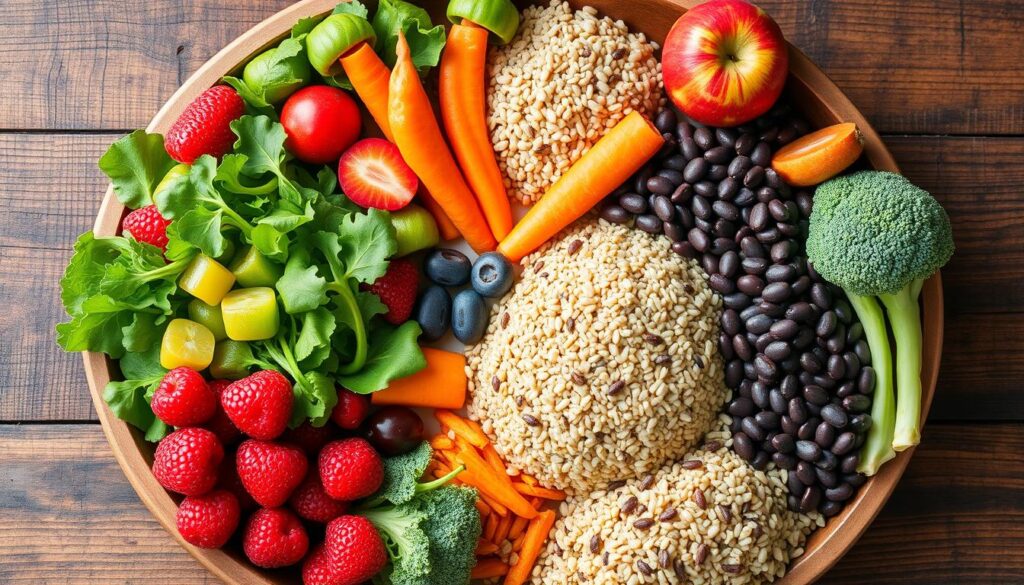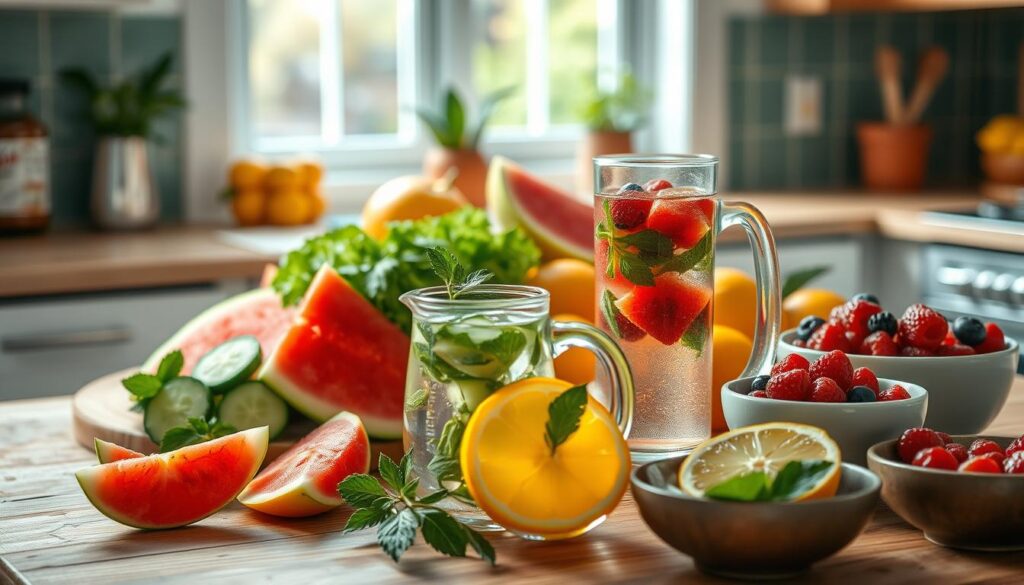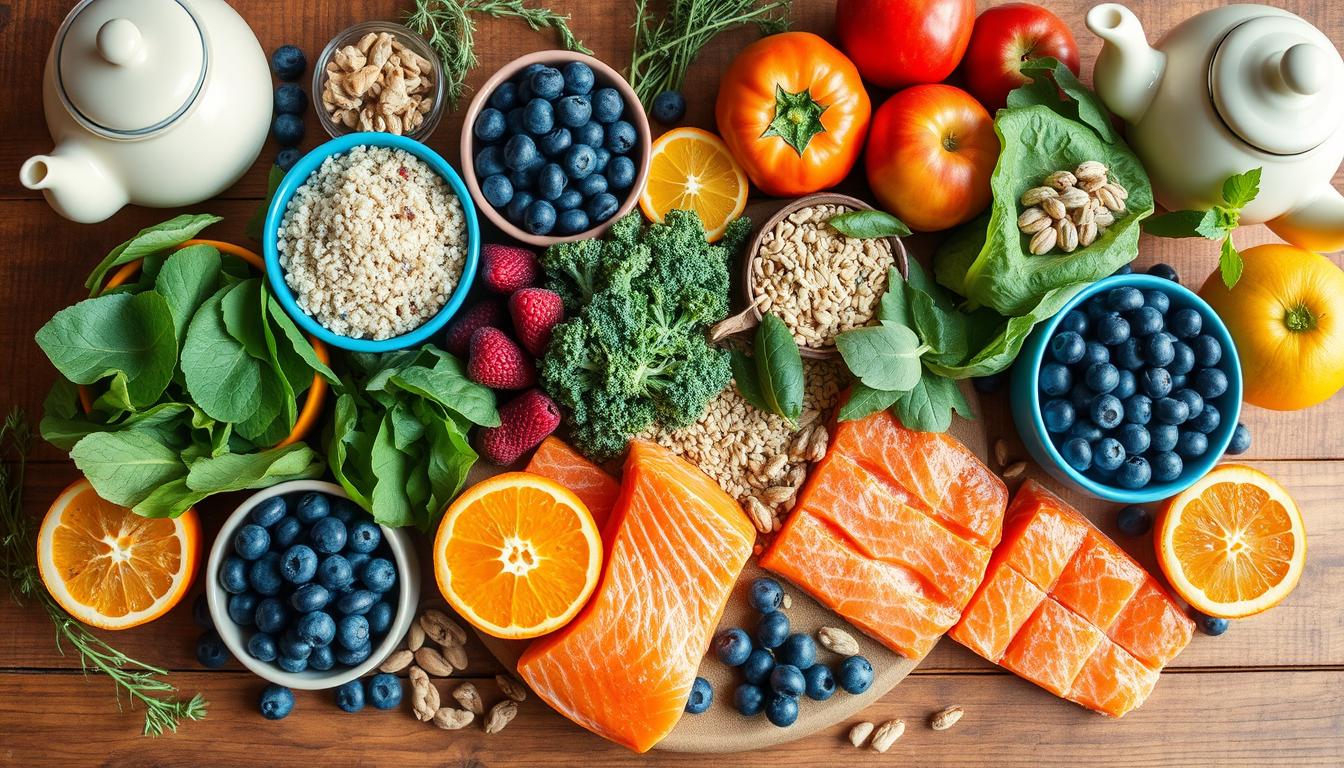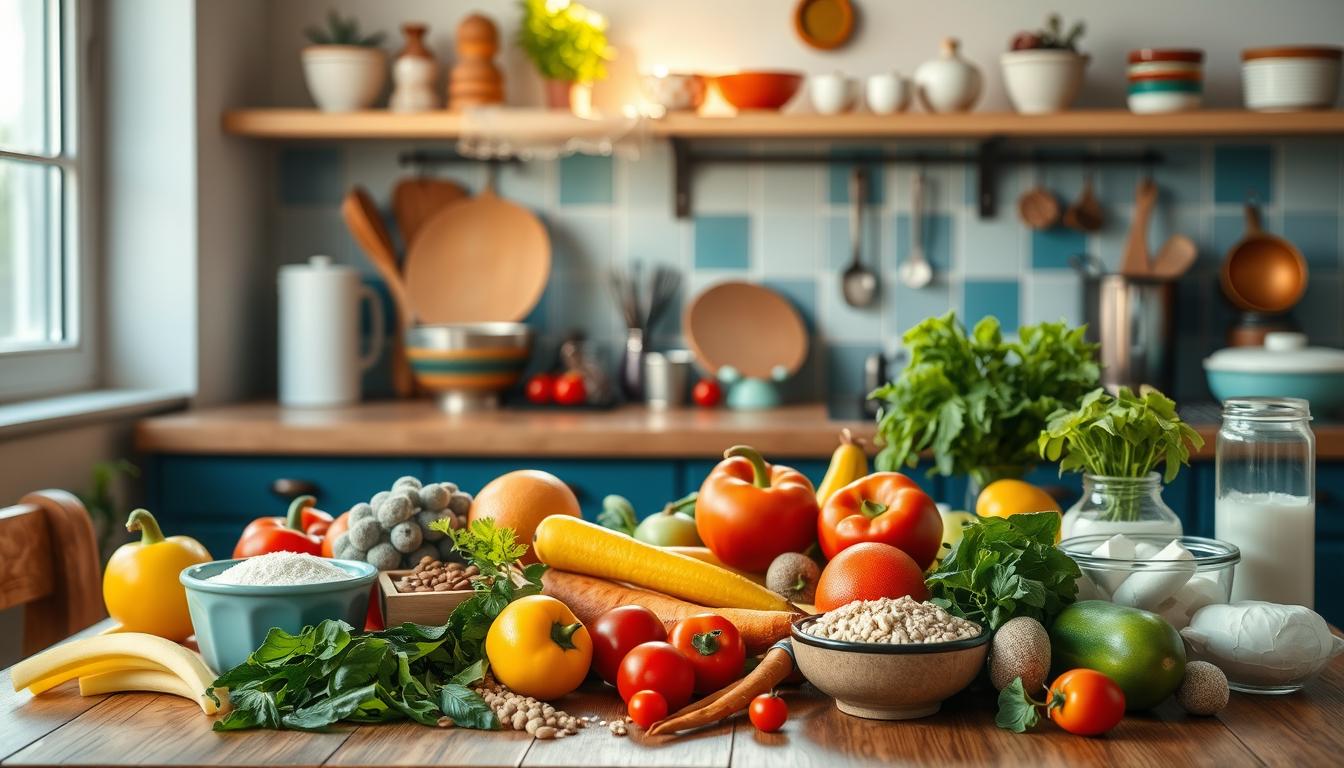Did you know over 54 million women in the United States are 70 or older? As we age, our diet needs change a lot. Eating a balanced diet is key for senior women to stay healthy and live longer. This guide will help you choose the best foods for women over 70, so you can enjoy your golden years.
Key Takeaways
- Understand the essential nutrients required for women over 70 to support their changing needs
- Discover power-packed protein sources to maintain muscle mass and strength
- Learn about smart carbohydrate choices for sustained energy and blood sugar regulation
- Explore calcium-rich and bone-supporting foods to prevent osteoporosis
- Discover hydrating, fluid-rich foods to support overall health and well-being
- Uncover heart-healthy meal planning and preparation tips for senior women
- Explore brain-boosting foods and memory-enhancing strategies
Essential Nutrients for Women Over 70: Understanding Your Changing Needs
As we age, our bodies need different nutrients to stay healthy. Women over 70 should focus on key vitamins and minerals. These help tackle aging challenges. A balanced diet with nutritious meals and recipes is key for well-being.
Key Vitamins and Minerals for Senior Women
Some vitamins and minerals are more important as we get older. Vitamin B12 is crucial for blood cells and brain function. But, it’s harder to absorb with age. Vitamin D is also vital for bones, and many seniors lack it. Calcium helps keep bones strong and prevent osteoporosis.
Daily Nutritional Requirements After 70
- Vitamin B12: 2.4 micrograms per day
- Vitamin D: 600-800 IU per day
- Calcium: 1,200 milligrams per day
Impact of Aging on Nutrient Absorption
Our bodies absorb nutrients less well as we age. This is due to lower stomach acid, changes in gut bacteria, and less enzyme activity. Eating nutrient-rich foods and using supplements can help meet daily needs.
Knowing your changing nutritional needs and addressing absorption issues is crucial. It helps create a diet rich in nutritious meals and recipes. This supports your health and well-being in your golden years.
HEALTHY FOOD FOR WOMEN ABOVE 70 YEARS
As women get older, eating right is key. A diet full of nutrients helps keep them healthy and strong. Clean eating is especially good for women over 70, helping them stay full of life and energy.
Leafy greens like spinach, kale, and Swiss chard are packed with vitamins and minerals. They fight off inflammation and keep the mind sharp. Adding them to salads or smoothies can really boost your health.
Fatty fish, including salmon and sardines, are great for the heart and brain. They’re full of omega-3s, which are essential for good health. Try to eat them at least twice a week for the best benefits.
- Berries, like blueberries and raspberries, are full of antioxidants. They protect cells and lower disease risk.
- Legumes, like lentils and chickpeas, offer protein and fiber. They help control blood sugar and support digestion.
- Whole grains, such as quinoa and brown rice, are rich in nutrients. They help you feel full and maintain a healthy weight.
Eating these foods daily can nourish your body and boost your immune system. A clean eating lifestyle can lead to better health and a longer life.
| Nutrient-Dense Food | Key Benefits |
|---|---|
| Leafy Greens | Combats inflammation, supports cognitive function, promotes healthy skin and hair |
| Fatty Fish | Maintains heart health, brain function, and joint mobility |
| Berries | Protects cells from damage and reduces the risk of chronic diseases |
| Legumes | Provides plant-based protein, fiber, and complex carbohydrates for digestive health |
| Whole Grains | Supports feelings of fullness and maintains a healthy weight |
“Eating a diet rich in nutrient-dense foods can be a powerful tool for women over 70 to maintain their health, boost their energy, and reduce the risk of age-related diseases.”
By choosing clean eating and these healthy foods, women over 70 can stay well and enjoy their golden years fully.
Power-Packed Protein Sources for Maintaining Muscle Mass
As we get older, keeping our muscle mass is key. Protein is essential for this. There are many options, both plant-based and animal-based, that are packed with nutrients. They help meet our protein needs and keep our muscles healthy.
Plant-Based Protein Options
If you want to eat more plant-based protein, here are some great choices:
- Legumes (lentils, chickpeas, black beans, etc.)
- Tofu and tempeh
- Quinoa
- Nuts and seeds (almonds, chia, hemp, etc.)
- Whole grains (oats, brown rice, whole wheat)
Animal Protein Recommendations
If you prefer animal proteins, choose lean and nutrient-rich ones:
- Lean poultry (chicken, turkey)
- Fish and seafood (salmon, tuna, shrimp)
- Eggs
- Low-fat dairy (Greek yogurt, cottage cheese)
Protein Timing and Portions
To get the most from protein, spread it out throughout the day. Aim for 20-30 grams of protein at each meal or snack. Mix different sources to meet all your nutritional needs.
By mixing plant-based and animal-based proteins in your nutritious meals and balanced diet, you help with weight management. This keeps your muscle mass healthy as you age.
Smart Carbohydrate Choices for Sustained Energy

As women age, keeping energy levels steady is key. Choosing high-fiber foods and complex carbs is smart. These foods give your body the energy it needs. They also help keep you healthy and prevent diseases.
Complex carbs like whole grains, legumes, and starchy veggies digest slowly. This means your body gets energy slowly, avoiding big energy drops. The fiber in these foods also helps your digestion and can control cholesterol and blood sugar.
- Whole wheat bread, quinoa, and brown rice are great for complex carbs.
- Beans, lentils, and peas are full of fiber and protein, making them great for any meal.
- Starchy veggies like sweet potatoes, pumpkin, and winter squash are packed with nutrients.
Eating a mix of high-fiber foods and complex carbs keeps you energized. It also supports your digestive health and overall well-being as you age.
| Carbohydrate Source | Fiber Content (per serving) | Benefits |
|---|---|---|
| Whole wheat bread | 3-4 grams | Provides complex carbs and fiber for sustained energy |
| Quinoa | 5 grams | Gluten-free whole grain with fiber and protein |
| Lentils | 8-10 grams | High in fiber and plant-based protein |
| Sweet potatoes | 4-6 grams | Starchy vegetable rich in fiber and vitamins |
Adding high-fiber foods and complex carbs to your diet is beneficial. It gives you the energy and health benefits you need as a woman over 70.
Crucial Minerals and Vitamins for Bone Health
As we get older, keeping our bones strong is key. The golden years change what our bodies need. It’s important to focus on the minerals and vitamins that help our bones stay healthy.
Calcium-Rich Food Sources
Calcium is vital for strong bones. Women over 70 need to eat foods rich in calcium. Here are some good options:
- Low-fat dairy products like milk, yogurt, and cheese
- Leafy green vegetables like kale, collards, and spinach
- Canned fish with bones, such as sardines and salmon
- Nuts and seeds, including almonds and chia seeds
Fortified plant-based milk alternatives
Vitamin D Enhancement Strategies
Vitamin D helps our bodies use calcium. As we age, our skin makes less vitamin D from sunlight. Here’s how to get enough:
- Spend a few minutes in the sun each day, if possible
- Eat foods rich in vitamin D, like fatty fish, egg yolks, and fortified dairy
- Talk to your doctor about taking vitamin D supplements
Bone-Supporting Nutrients
Calcium and vitamin D are not the only important nutrients for bones. Other key ones include:
- Magnesium, found in whole grains, nuts, and leafy greens
- Vitamin K, abundant in leafy vegetables and fermented foods
- Phosphorus, present in protein-rich foods like meat, fish, and dairy
Eating a variety of foods rich in these nutrients is good for bones. It helps senior women stay healthy and enjoy their golden years.
Hydration and Fluid-Rich Foods for Optimal Health

Staying hydrated is key for women over 70. Our bodies find it harder to keep the right amount of fluids as we get older. Dehydration can cause fatigue, headaches, and even more serious problems. So, it’s important to eat foods that help us stay hydrated.
Eating fluid-rich foods is a great way to stay hydrated and healthy. These foods are not only good for drinking but also packed with vitamins, minerals, and antioxidants. They help keep our bodies in top shape.
- Juicy fruits like watermelon, cantaloupe, and oranges are excellent sources of water and electrolytes.
- Veggies such as cucumbers, tomatoes, and leafy greens are also high in water content.
- Soups, broths, and stews can be comforting and hydrating, especially during colder months.
- Dairy products like yogurt and milk can contribute to your daily fluid intake.
It’s also important to drink enough water throughout the day. Try to drink at least eight 8-ounce glasses of water. Set reminders to drink water often. Checking your urine color is a simple way to see if you’re drinking enough water. If it’s light, you’re good to go.
“Proper hydration is essential for maintaining optimal health, especially as we age. By making healthy food for women above 70 years a priority, we can ensure our bodies have the fluids they need to function at their best.”
Staying hydrated is a big part of aging well and staying healthy. Use fluid-rich foods and make drinking water a daily habit. This will help you stay healthy and full of energy.
Heart-Healthy Meal Planning and Preparation Tips
Women over 70 need a nutritious diet to keep their hearts healthy and prevent diseases. It’s key to focus on meal planning and preparation that’s easy to do every day.
Low-Sodium Cooking Methods
It’s vital to cut down on sodium to keep blood pressure healthy and support the heart. Here are some low-sodium cooking tips:
- Choose fresh, unprocessed foods to avoid extra sodium.
- Use herbs, spices, and lemon juice for flavor instead of salt.
- Cook with unsalted broths or water and don’t add salt while cooking.
- Rinse canned beans, vegetables, and other canned items to remove sodium.
Heart-Protective Ingredients
Adding heart-healthy ingredients to your meals can boost your health. Some good options include:
- Omega-3 foods like salmon, walnuts, and flaxseeds for heart health.
- Fiber-rich whole grains, legumes, and leafy greens for a balanced diet.
- Antioxidant-rich fruits and vegetables like berries, tomatoes, and leafy greens.
By using low-sodium cooking and adding heart-protective ingredients, women over 70 can make healthy meals. These meals support their health and well-being.
“Eating a balanced, nutrient-rich diet is one of the most effective ways to maintain cardiovascular health and reduce the risk of chronic diseases as we age.”
Brain-Boosting Foods and Memory Enhancement
As I’ve grown older, I’ve learned how crucial a healthy diet is for my brain. I’m excited to share my favorite foods and tips for keeping my mind sharp.
Omega-3 fatty acids are key for brain health. You can find them in fatty fish like salmon, mackerel, and sardines. These fats reduce inflammation and help connect brain cells, boosting memory and focus. Adding these foods to my meals has really helped my mental clarity.
Antioxidant-rich berries are also great for the brain. Blueberries, raspberries, and blackberries protect brain cells and improve thinking. I enjoy smoothies and salads with these berries to stay mentally sharp as I age.
FAQ
What are the essential nutrients that women over 70 need to maintain optimal health?
As we age, our bodies need different nutrients. Women over 70 should focus on vitamin B12, vitamin D, calcium, and protein. These nutrients help keep bones strong, muscles healthy, and the immune system working well. They also support brain function.
How do I ensure I’m getting enough protein to maintain muscle mass?
Eating a mix of protein-rich foods is key. Choose lean meats, poultry, fish, eggs, legumes, nuts, and seeds. Aim for 20-30 grams of protein at each meal.
What are some heart-healthy meal preparation tips for women over 70?
For a healthy heart, use low-sodium cooking methods like baking, grilling, or steaming. Add heart-healthy ingredients like olive oil, fatty fish, nuts, and veggies rich in fiber and antioxidants.
How can I incorporate brain-boosting foods into my diet?
Eat foods high in omega-3s, antioxidants, and B vitamins for brain health. Good choices include fatty fish, berries, nuts, leafy greens, and whole grains.
What are some high-fiber foods that can help with digestion and overall health?
High-fiber foods like beans, lentils, whole grains, fruits, and veggies are great. They help with digestion, keep you full, and manage blood sugar.
How can I ensure I’m staying hydrated as I age?
Drinking enough water is vital for health. Drink water and eat foods with lots of water, like soups, fruits, and veggies. Aim for 8 cups of fluids daily.
What are some strategies for maintaining strong bones as I get older?
Eat foods rich in calcium, like dairy, leafy greens, and fortified foods. Also, make sure you get enough vitamin D from sunlight or supplements. This helps keep bones strong and dense.



